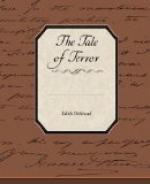To pass from the work of Mrs. Radcliffe to that of Matthew Gregory Lewis is to leave “the novel of suspense,” which depends for part of its effect on the human instinct of curiosity, for “the novel of terror,” which works almost entirely on the even stronger and more primitive instinct of fear. Those who find Mrs. Radcliffe’s unruffled pace leisurely beyond endurance, or who dislike her coldly reasonable methods of accounting for what is only apparently supernatural, or who sometimes feel stifled by the oppressive air of gentility that broods over her romantic world, will find ample reparation in the melodramatic pages of “Monk” Lewis. Here, indeed, may those who will and dare sup full with horrors. Lewis, in reckless abandonment, throws to the winds all restraint, both moral and artistic, that had bound his predecessor. The incidents, which follow one another in kaleidoscopic variety, are like the disjointed phases of a delirium or nightmare, from which there is no escape. We are conscious that his story is unreal or even ludicrous, yet Lewis has a certain dogged power of driving us unrelentingly through it, regardless of our own will. Literary historians have tended to over-emphasise the connection between Mrs. Radcliffe and Lewis. Their purposes and achievement are so different that it is hardly accurate to speak of them as belonging to the same school. It is true that in one of his letters Lewis asserts that he was induced to go on with his romance, The Monk, by reading The Mysteries of Udolpho, “one of the most interesting books that has (sic) ever been written,” and that he was struck by the resemblance of his own character to that of Montoni;[40] but his literary debt to Mrs. Radcliffe is comparatively insignificant. His depredations on German literature are much more serious and extensive. Lewis, indeed, is one of the Dick Turpins of fiction and seizes his booty where he will in a high-handed and somewhat unscrupulous fashion, but for many of Mrs. Radcliffe’s treasures he could find no use. Her picturesque backgrounds, her ingenious explanations of the uncanny, her uneventful interludes and long deferred but happy endings were outside his province. The moments in her novels which Lewis admired and strove to emulate were those during which the reader with quickened pulse breathlessly awaits some startling development. Of these moments, there are, it must be frankly owned, few in Mrs. Radcliffe’s novels. Lewis’s mistake lay in trying to induce a more rapid palpitation, and to prolong it almost uninterruptedly throughout his novel. By attempting a physical and mental impossibility he courts disaster. Mrs. Radcliffe’s skeletons are decently concealed in the family cupboard, Lewis’s stalk abroad in shameless publicity. In Mrs. Radcliffe’s stories, the shadow fades and disappears just when we think we are close upon the substance; for, after we have long been groping in the twilight of fearful imaginings, she suddenly jerks back the shutter to admit the clear light of reason. In Lewis’s wonder-world there are no elusive shadows; he hurls us without preparation or initiation into a daylight orgy of horrors.




